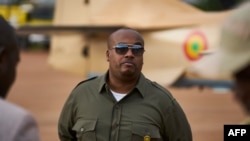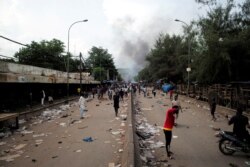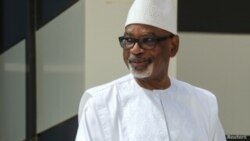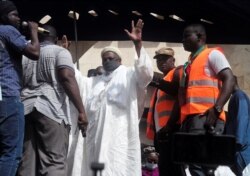Pressure from protesters has pushed the son of Malian President Ibrahim Boubacar Keita to resign from his position as chair of the parliament’s Defense Committee.
On Monday, Keita’s son, Karim Keita, issued a statement announcing his resignation. “For my part, I put Mali above all else,” he said. “No sacrifice is too great for Mali. I don’t want to be an argument for people in need of a program or a hindrance to dialogue between Malians.”
The president has made other concessions in a bid to restore calm to the capital, Bamako, after several large anti-government protests, the most recent on Friday. On Monday, 20 opposition members were freed from custody.
At least 11 people have been killed, including a 15-year-old, and more than 100 wounded in the anti-government protests, according to Amnesty International.
Friday’s protests, organized by a group calling itself the June 5 Movement, or M5, were the third mass demonstrations in just over a month calling for the removal of President Keita. Mali’s state broadcaster, ORTM, was forced to go off the air after demonstrators occupied its offices.
On Saturday, Keita took to the airwaves to announce a series of reforms including the dissolution of Mali’s Constitutional Court.
The Court had been a focal point of protester anger after it overturned the results of parliamentary elections in March. Leaders from West Africa’s regional bloc, ECOWAS, had recommended dissolving the Court and repeating the elections.
“So I have decided to repeal the licenses of the remaining members of the Constitutional Court and to move towards the implementation of the recommendations of the Economic Community of West African States,” Keita said.
The recent legislative elections were “marred by alleged fraud that has led to the election of numerous of the MPs,” Ousmane Diallo, a researcher at Amnesty International, told VOA. “People see that the situation in Mali has not been improving over the years.”
M5, the group leading the protests, is a diverse coalition of religious leaders, political opposition figures and civil society groups. One voice that has risen to prominence in the protest movement is that of Mahmoud Dicko, an influential conservative cleric. He once supported Keita but now says he is disillusioned by the corruption he sees in the government.
Some of the protesters killed during the weekend’s violence died in front of his mosque. Malian Prime Minister Boubou Cisse personally visited Dicko late Sunday night in an apparent appeal for calm.
“The combat that we’re leading is to restore the Malian nation,” Dicko told AFP. “To once again give this nation its dignity, its honor. To make sure that this catastrophic governance that has led us to this situation where Mali is being spoiled right before our eyes would not be a reality; it would be a memory.”
In the streets of Bamako opinion was mixed with some echoing calls for Keita’s ouster and others stressing that maintaining security in the fragile country is most important.
“I don’t like what is happening in the country because of the infighting. Let that person [the president] finish his five-year term in office. Then, whoever comes next shall be elected to office,” said a Bamako resident who identified herself as Toure. “These folks want to destroy everything around here. And no one will benefit from it. Fighting does not build a country, it only destroys it.”
Others have simply had enough and believe it is time for a change in leadership.
“We are tired and oppressed. Our children are also tired, no school nor enough food to feed our families. What we need is Ibrahim Boubacar to leave so the country could prosper,” said Fotoumata Bathily, another protester.
One protester stressed that the demonstration in the streets is a sign that the Malian people are holding their leaders accountable and demanding good governance after decades of corruption and instability.
“Mali belongs to us, Malians are standing up to say no to corruption, no to the appointment to the National Assembly, no to demagogy. Mali is going to run itself with good governance,” protester Sekou Kouyate said, speaking to the Associated Press.
In the wake of the violence, Amnesty International is calling for an investigation into the deaths of the protesters and the actions of security forces.
Bambara Service's Modibo Dembele from Bamako and Mohamed Toure from Washington contributed to this report.







